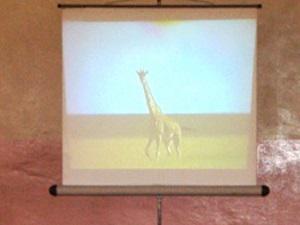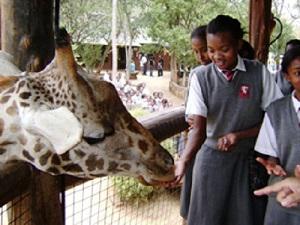Gabriel Ngale
This project aims to educate and involve the Kenyan school youths and public at large in conservation through educational programs, issuing conservation publications and initiating conservation activities.

MEU film.
The Mobile Education Unit (MEU) Project of the Wildlife Clubs of Kenya (WCK) will play a key role in building the understanding and involvement of the Kenyan youth and public at large in nature conservation which is key to our future generation’s survival. Equipped with a vehicle, audio-visual equipment and a competent officer the MEU Project will visit and benefit the targeted 544 schools in the nine regions of Kenya namely North Rift, Mt Kenya, North Eastern and Eastern, Central Rift Valley, Nairobi, South Rift valley, Central and South Nairobi in the month of January, February, March, May, June, July, September and October respectively in 2009 and 2010.

Students & Giraffe.
During the visits to schools and communities, the MEU will show conservation films, give talks on conservation and issue Wildlife Clubs of Kenya publications. The Project will as well guide school children and communities in initiating conservation activities and creating wildlife habitats. The MEU Project will establish a total of 30 bird feeding tables in the North Rift, Central Rift Valley and Central regions of Kenya. Indigenous seedlings will be raised from respective localities to create and restore 20 wildlife habitats in the Mt Kenya and Nairobi regions. The project will guide school children and communities on how to plant and label trees in 20 various schools and degraded forests in Eastern and South Rift regions of Kenya.
The project will therefore tackle two major aspects. One on undertaking conservation education to the Kenyan youth in schools. Reaching the school youths is important because the youth comprise 75% of the Kenyan population. There understanding and involvement in nature conservation is therefore vital. Also the youth today spend most of their time learning and therefore schools remain the appropriate channels to reach them.
Secondly guiding the schools and communities in initiating activities will not only instil knowledge and build conservation interest among them, but will also act as a solution to local conservation challenges.
The well established grassroots structure of the Wildlife Clubs of Kenya will help organize the project activities. They include the School Wildlife Club members, Action Groups (Volunteer teachers) from every region, Wildlife Clubs Kenya Education Officers as well as partner organizations and local community groups.
The MEU project is a charitable program and will be implemented at a free cost to the schools and communities in all the regions in Kenya.